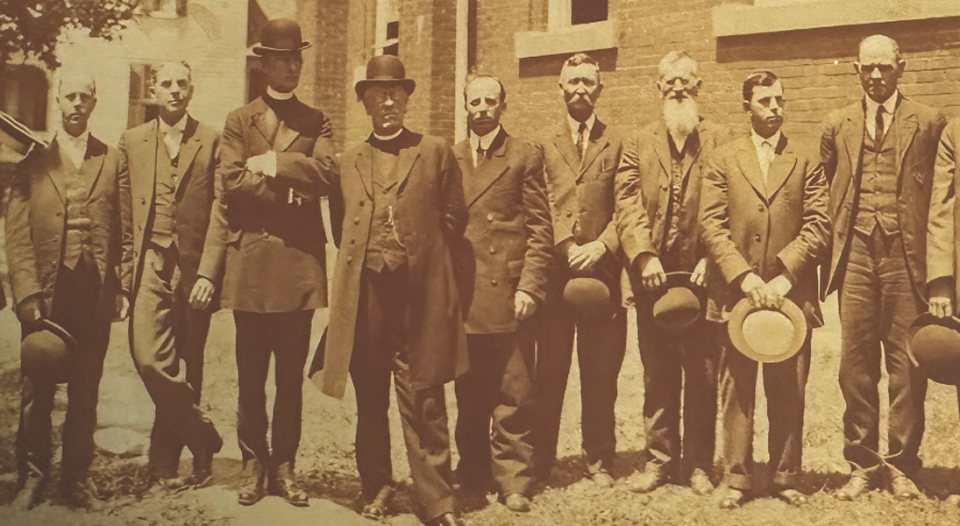Passing the Sunday-morning offering plate has traditionally been a visible role for church men. But it was the passing of a much bigger offering plate that cemented the legacy of North Carolina Lutheran Men in Mission (NCLMM), which this year celebrates 100 years of ministry and is recognized as the granddaddy of men’s groups across the ELCA.
And as Lutheran men in North Carolina look ahead to their next 100 years, they and national leaders acknowledge that new challenges await them amid a changing church landscape.
In 1922, Lutherans had been in North Carolina for a good century and a half, yet congregations were clustered in only one-fourth of the state’s 100 counties. In some areas closer to the Atlantic coast, a churchgoer could drive the dusty roads of the rural state for 200 miles without finding a Lutheran presence.
It was time for an intentional outreach effort, the synod president declared.
At the next statewide convention, in Kings Mountain, 30 miles west of Charlotte, 10 men from St. Matthew Lutheran Church stepped forward, each pledging the then-whopping sum of $100—about $1,750 today—for each of the next 10 years to establish a loan fund to help congregations build. Other men across the synod were given the task of raising the remaining $90,000, and by 1923 laymen who had begun organizing local “brotherhoods” came together to create their synodwide Brotherhood of the United Evangelical Synod of North Carolina.
Lutheran men everywhere have adopted countless projects and ministries over the years…. But in North Carolina, the loan and gift fund was what “held the organization together.”
Lutherans outside North Carolina soon took notice and began borrowing the idea of a “loan and gift fund” to help new and existing congregations build and grow even through the approaching Great Depression—and beyond.
One hundred years later, that brotherhood can point to Lutheran congregations across 60 of North Carolina’s 100 counties and know that more than half of those church buildings were built, renovated or improved with low-interest loans that today total more than $8.5 million.
Of course, Lutheran men everywhere have adopted countless other projects and ministries over the years: scouting, retreats, disaster response, worship assistance and marriage workshops. But in North Carolina, the loan and gift fund was what “held the organization together,” wrote H. George Anderson, the ELCA’s second presiding bishop, in a history of the NCLMM. The fund endures today, also providing scholarships to seminarians and, since 2006, endowing a professorship in Bible and mission at Lutheran Theological Southern Seminary of Lenoir-Rhyne University in Columbia, S.C.
The future of men’s ministries
Now, at the dawn of a seismic shift in church attendance and religious affiliation, Lutheran men are joining church leaders of every denomination in assessing how best to continue their ministries.
“We tend to joke around the fact that men’s ministries happen most often over breakfast or at the local McDonald’s,” said John Sundquist, executive director of the national Lutheran Men in Mission. But the reality in 2023, he said, is that young men “have no desire to get up and go to a breakfast. Even getting them to go to church is a challenge.”
The statistics—like the view inside sanctuaries on Sunday morning—bear that out. Whereas 90% of Americans identified as “Christian” in 1972, only 64% did by 2020, according to the General Social Survey. When gender is factored in, men show even less interest and participation in religious life than do women. In the United States that gender gap is curiously wider than in other developed nations.
Across the board, across denominations and across the country, men attend worship services less than women, report praying less than women and count religion less important in their lives than do women.
“The numbers are truly frightening,” said Sundquist, a pastor of the American Baptist Churches USA. It’s time, he suggests, to move men’s ministries beyond pancake suppers and building repairs. “We’ve got to change some things,” he said.
Toward that end Lutheran Men in Mission has augmented the traditional men’s focus on projects and building stuff with resources to help men build relationships—with one another and with Christ. “There are practically no men’s ministries that focus on discipleship,” Sundquist said. In 2019 reports from ELCA churches, only a third of congregations reported a men’s ministry of any description.
“There are practically no men’s ministries that focus on discipleship.”
Yet the one thing he insists won’t change—no matter the century—is the organization’s mission: “For every man to be a bold, daring follower of Jesus Christ.”
To better reach a target audience of people who, most studies agree, are more hesitant to make friends and be vulnerable, Lutheran Men in Mission has in recent years developed resources that Sundquist described as “welcoming and not ‘churchy.’”
A popular 48-hour retreat called “One Year to Live” is “not your typical men’s retreat,” promises lutheranmeninmission.org. Five retreats are scheduled for 2023, from South Carolina to Washington state. And online resources aimed at men who are younger and more diverse are held up as “trail guides” to help men “become better men, fathers, husbands, and leaders” (ProjectTwelve.net).
Back in North Carolina, Terry Edwards, NCLMM coordinator, was busy planning for the centennial celebration. But alongside that March event, Edwards was juggling incoming calls for more building needs. Disaster relief partners asked if the group’s fully loaded tool trailers were available for another rescue run, this time to tornado victims in Kentucky or perhaps hurricane survivors in Florida. Where once were homes, a Kentucky relief partner said, “there’s just concrete pads and some plumbing sticking up.”
As Lutheran men’s groups adapt to a new century and new needs, Edwards agreed with Sundquist that “it’s a challenge to draw younger men in.”
What hasn’t changed—and probably never will—is the work to be done, all in the name of a savior who likely began his earthly service in, of all places, a carpenter’s shop.




